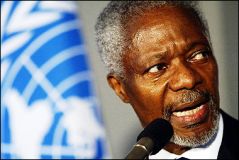Annan tells Sudan to control militia in Darfur
By Evelyn Leopold
UNITED NATIONS, Feb 2, 2005 (Reuters) – U.N. Secretary-General Kofi Annan said on Wednesday he told Sudan’s president to either rein in brutal militia in Darfur or face demands for sanctions in the Security Council.
 Annan said he spoke to President Omar Hassan al-Bashir at the just-concluded African Union summit in Nigeria, saying “it was essential” Khartoum bring the situation under control.
Annan said he spoke to President Omar Hassan al-Bashir at the just-concluded African Union summit in Nigeria, saying “it was essential” Khartoum bring the situation under control.
A U.N.-appointed commission, in the most extensive report on Darfur to date, found widespread crimes in Darfur by the government and pro-government Janjaweed militia accused of pillaging, slaughter and rape. It said this did not constitute genocide but may be “no less heinous”.
Annan, who favors sanctions, said he told al-Bashir his government should stop aerial bombing and “really take measures to rein in the Janjaweed, and others.”
“If they do not do that, as far as I am concerned sanctions were still on the table and the Council may have to take further action,” Annan told reporters.
The United States would like the Security Council to impose the sanctions threatened in a resolution last year — a travel and assets freeze against those responsible for the atrocities, an arms embargo on Darfur and an oil embargo. But China and Russia opposed penalties last year, particularly on oil.
Annan said he expected the Security Council next week to hear from the main negotiators of a peace agreement in southern Sudan, a conflict that started two decades before the violence in Darfur — Ali Osman Mohamed Taha, Sudan’s vice president, and John Garang, the head of the southern rebel Sudan People’s Liberation Army.
A representative of the AU, which has fielded troops and monitors in Darfur, will also address the council, he said.
COUNCIL MEMBERS DISAGREE ON PROSECUTIONS
Despite pictures and reports of displaced and brutalized villagers that have prompted outrage around the world, the major powers on the Council differ not only over sanctions but where to prosecute those responsible for atrocities in Darfur.
“They must be prosecuted, whichever way the Council decides to go,” Annan said. The new report recommended trying the perpetrators at the Hague-based International Criminal Court and sent Annan a sealed list of suspects.
The Bush administration strongly opposes the ICC, a permanent court set up to try individuals for genocide, war crimes and massive human-rights abuses, which Europeans and others support. It fears politically motivated prosecutions against U.S. soldiers abroad.
Instead, the United States is pushing for a new, temporary U.N.-African Union tribunal in Tanzania, and is lobbying African nations, whose support could undermine the Europeans’ case for the ICC.
Among the 15 Security Council nations, 13 have signed the treaty creating the ICC and nine of them have ratified it. Only China, aside from the United States, has neither signed nor ratified, but is unlikely to use its veto power.
British Foreign Secretary Jack Straw, a supporter of the ICC, said his country was seeking “consensus” among Council members, noting that not all had ratified the treaty.
Britain’s position has raised eyebrows among Europeans and others, with human rights groups concerned that London will not put up a fight for the ICC, even if it means a U.S. veto.
“To the extent that the British are expressing a willingness to talk about all the options then that’s a step forward,” said a U.S. official in Washington, adding, however, “I don’t think we are anywhere near wrapping this up.”
The Security Council can refer cases to the court if the countries concerned are unwilling or unable to do so.
